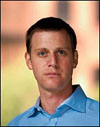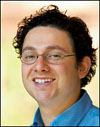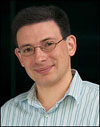HLS adds five new professors to its ranks
Hires will add breadth and depth to curriculum
The ranks of the Harvard Law School (HLS) faculty expanded over the summer with the arrival of three new assistant professors and two new tenured professors of law. The hires are part of an effort to bring about a net increase of 15 faculty members during the next decade.
In addition to reducing the student/faculty ratio, the new faculty members bring expertise in a range of subjects, including environmental law, constitutional law, administrative law, and legal history.
“It’s very difficult to find the kind of teaching talent and scholarly accomplishment that we look for in faculty members, so we count ourselves very fortunate to have made these hires,” said Dean Elena Kagan. “Each of these men and women brings an enormous amount to Harvard Law School. Our students will benefit from their dedication to teaching, and the world will benefit from their contributions to legal scholarship.”

The permanent HLS faculty (not including visiting professors, lecturers, and emeriti) now stands at 82 professors and assistant professors of law.
The new faculty members follow:
Professor Jody Freeman: Freeman comes to HLS from the UCLA School of Law, where she taught administrative law, environmental law, and a course titled “Toxic Torts.” She has published widely on administrative and environmental law; one of her recent articles, “Extending Public Law Norms Through Privatization,” was published by the Harvard Law Review in 2003. In addition to earning LL.M. and S.J.D. degrees from HLS, Freeman holds a B.A. from Stanford University and an LL.B. from the University of Toronto. This year, she is teaching “Administrative Law,” “Natural Resources,” and a seminar on regional ecosystem management.

Assistant Professor Adriaan Lanni: A legal historian, Lanni holds a doctoral degree in history from the University of Michigan, as well as degrees in classical civilizations and law from Yale University. She also earned a degree in classics from Cambridge University. Her doctoral dissertation focused on the law courts of classical Athens, and her most recent article, “The Future of Community Justice,” will be published in the forthcoming issue of the Harvard Civil Rights-Civil Liberties Law Review. She is teaching “Criminal Law and Legal History: Topics in Ancient Law.”

Professor Daryl Levinson: Levinson is a constitutional law expert who comes to HLS from the New York University School of Law. He also taught at the University of Virginia, where he earned master’s and law degrees after completing his undergraduate work at Harvard College. His research focuses primarily on constitutional issues. His most recent article, “Empire-Building Government in Constitutional Law,” was published by the Harvard Law Review in 2005. Levinson has also taught courses on law and political participation, criminal law, and constitutional design. This year he is teaching “Remedies.”

Assistant Professor Jed Shugerman: An expert on history and the American judicial system, Shugerman is currently completing his doctoral studies in history at Yale University. He holds a J.D. from Yale Law School, where he was senior editor of the Yale Law Journal, and a B.A. from Yale College, where he graduated Phi Beta Kappa with a degree in history. His research has focused on judicial independence, the adoption of judicial elections in the United States and the effect of this system on tort law and constitutionalism. He will teach “Torts” in the spring semester.

Assistant Professor Matthew Stephenson: Appointed to the faculty a year ago, Stephenson recently completed a Supreme Court clerkship with Associate Justice Anthony Kennedy. In addition to his J.D., he holds a Ph.D. in political science and an A.B. in East Asian studies – both from Harvard. A former Harvard-Yenching Fellow, he has written about legal issues in China and Japan, as well as more recent articles on U.S. federal agencies and judicial power. Stephenson is teaching “Administrative Law,” “Environmental Law,” and a seminar titled “Quantitative Social Science: Law, Expert Witnesses, and Litigation.”




